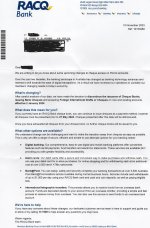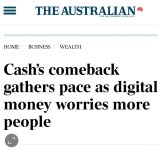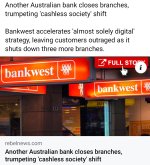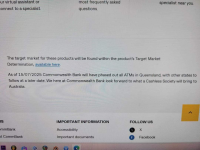Australia is rapidly heading towards a 'cashless society", with one expert predicting physical money will be completely gone by the end of the decade.
Australia is rapidly heading towards becoming a "cashless society" as banks crack down on withdrawals, close ATMs and branches and ban cash altogether ? with one expert predicting physical money will be completely gone by the end of the decade.
"I'd say we'll be functionally cashless by the end of 2025 ? it'll just be a complete rarity,? said Richard Holden, professor of economics at UNSW Business School.
?But unless the government gets involved to accelerate the process I think we?ll be actually cashless by 2030.?
Macquarie Bank this week announced it would be phasing out cash altogether next year, following similar moves by Commonwealth Bank, NAB and ANZ to stop handling cash in a few branches.
The shock announcement comes after banks? efforts to make it more difficult for customers to transact in cash have sparked backlash in recent months.
In July, a pro poker player slammed Westpac for a ?totalitarian experience? after his account was blocked following a ?very modest? cash deposit, claiming the fraud team refused to unblock his account unless he ?adequately explained these funds? which he told them was ?none of their business?.
Others have expressed frustration at being grilled by bank tellers when trying to withdraw more than $2000 in cash ? a policy intended to uncover money laundering or other criminal activity.
Last month, an Aussie comedian filmed himself giving a series of outlandish reasons why he was withdrawing $6000 in a viral TikTok video.
?Drugs, coke, the devil?s lettuce, you would know,? Jon-Bernard Kairouz told one teller.?
The death of cash
There?s no denying the numbers look bad for the future of cash.
Australian Bureau of Statistics (ABS) data shows a dramatic drop in ATM use in recent years, down from 78 million withdrawals in December 2008 to only 30 million in June this year.
According to the Finance Sector Union (FSU), between June 2017 and June 2022 more than 1600 bank branches were closed, with a disproportionate number located in regional Australia.
Reserve Bank of Australia (RBA) figures show the majority of transactions in Australia are now made using electronic payment methods rather than cash, and cheques are now ?rarely used?.
However the use of cash has ticked up slightly after Covid, with an RBA survey finding cash was used in 27 per cent of in-person transactions in 2021, compared with 23 per cent in 2020.
ATM cash withdrawals and banknote deposits have similarly increased from their pandemic lockdown lows.
The pandemic also saw more businesses refusing cash altogether, although cash acceptance remains high overall at 94 per cent in June 2022, from 99 per cent in February 2020, according to the RBA.
?Despite the ongoing decline in the use of cash for transactions, a significant minority of face-to-face payments are still made in cash and some members of the community prefer to use cash for their everyday payments,? the RBA said in its 2022 Payments System Board annual report.
?Older Australians, for example, tend to use cash more frequently on average than people in other age groups.?
The RBA also notes that while Australians are using cash less frequently for transactions, overall demand for cash remains strong.
?The value of banknotes in circulation grew particularly strongly during the pandemic, with circulation growing by 23 per cent from December 2019 to December 2021,? it said.
?Much of the increase in demand was for high-denomination banknotes ($50s and $100s), suggesting that many people in the community continue to view holding banknotes as desirable for precautionary (i.e. emergency) or store-of-wealth purposes, especially in times of economic uncertainty.?
A recent survey of nearly 1100 people by comparison website Finder found 55 per cent of Australians use cash less than once per week, 14 per cent only a few times a year and 13 per cent never using it at all.
?We may never be a 100 per cent cashless society, but any society where you can do 95 per cent of your day-to-day business without cash is as close to cashless as making no odds,? said Finder head of consumer research Graham Cooke.
?With the increasing uptake of plastic across small shops, food vans and even Big Issue sellers, Aussies are finding that the convenience of carrying a card ? or just your phone ? is preferable to lugging around pocketfuls of coins. This is especially true in Sydney, where you can use the same phone to pay for public transport.?
Mr Cooke warned that this was ?not necessarily a positive move?, as many businesses still charge a fee for accepting credit or debit cards ?allegedly to cove the cost of the transaction?.
?This, however, ignores the significant costs of handling cash,? he added.
?The UK?s move of banning any transaction surcharges no matter what payment method is used could be the way to go for Australia. For those looking to reduce fees, Eftpos cards are often cheaper to use, and less risky, than credit.?
More: https://www.news.com.au/finance/eco...5/news-story/be06a51f917fe42d5fc2f49f23df6d02
Australia is rapidly heading towards becoming a "cashless society" as banks crack down on withdrawals, close ATMs and branches and ban cash altogether ? with one expert predicting physical money will be completely gone by the end of the decade.
"I'd say we'll be functionally cashless by the end of 2025 ? it'll just be a complete rarity,? said Richard Holden, professor of economics at UNSW Business School.
?But unless the government gets involved to accelerate the process I think we?ll be actually cashless by 2030.?
Macquarie Bank this week announced it would be phasing out cash altogether next year, following similar moves by Commonwealth Bank, NAB and ANZ to stop handling cash in a few branches.
The shock announcement comes after banks? efforts to make it more difficult for customers to transact in cash have sparked backlash in recent months.
In July, a pro poker player slammed Westpac for a ?totalitarian experience? after his account was blocked following a ?very modest? cash deposit, claiming the fraud team refused to unblock his account unless he ?adequately explained these funds? which he told them was ?none of their business?.
Others have expressed frustration at being grilled by bank tellers when trying to withdraw more than $2000 in cash ? a policy intended to uncover money laundering or other criminal activity.
Last month, an Aussie comedian filmed himself giving a series of outlandish reasons why he was withdrawing $6000 in a viral TikTok video.
?Drugs, coke, the devil?s lettuce, you would know,? Jon-Bernard Kairouz told one teller.?
The death of cash
There?s no denying the numbers look bad for the future of cash.
Australian Bureau of Statistics (ABS) data shows a dramatic drop in ATM use in recent years, down from 78 million withdrawals in December 2008 to only 30 million in June this year.
According to the Finance Sector Union (FSU), between June 2017 and June 2022 more than 1600 bank branches were closed, with a disproportionate number located in regional Australia.
Reserve Bank of Australia (RBA) figures show the majority of transactions in Australia are now made using electronic payment methods rather than cash, and cheques are now ?rarely used?.
However the use of cash has ticked up slightly after Covid, with an RBA survey finding cash was used in 27 per cent of in-person transactions in 2021, compared with 23 per cent in 2020.
ATM cash withdrawals and banknote deposits have similarly increased from their pandemic lockdown lows.
The pandemic also saw more businesses refusing cash altogether, although cash acceptance remains high overall at 94 per cent in June 2022, from 99 per cent in February 2020, according to the RBA.
?Despite the ongoing decline in the use of cash for transactions, a significant minority of face-to-face payments are still made in cash and some members of the community prefer to use cash for their everyday payments,? the RBA said in its 2022 Payments System Board annual report.
?Older Australians, for example, tend to use cash more frequently on average than people in other age groups.?
The RBA also notes that while Australians are using cash less frequently for transactions, overall demand for cash remains strong.
?The value of banknotes in circulation grew particularly strongly during the pandemic, with circulation growing by 23 per cent from December 2019 to December 2021,? it said.
?Much of the increase in demand was for high-denomination banknotes ($50s and $100s), suggesting that many people in the community continue to view holding banknotes as desirable for precautionary (i.e. emergency) or store-of-wealth purposes, especially in times of economic uncertainty.?
A recent survey of nearly 1100 people by comparison website Finder found 55 per cent of Australians use cash less than once per week, 14 per cent only a few times a year and 13 per cent never using it at all.
?We may never be a 100 per cent cashless society, but any society where you can do 95 per cent of your day-to-day business without cash is as close to cashless as making no odds,? said Finder head of consumer research Graham Cooke.
?With the increasing uptake of plastic across small shops, food vans and even Big Issue sellers, Aussies are finding that the convenience of carrying a card ? or just your phone ? is preferable to lugging around pocketfuls of coins. This is especially true in Sydney, where you can use the same phone to pay for public transport.?
Mr Cooke warned that this was ?not necessarily a positive move?, as many businesses still charge a fee for accepting credit or debit cards ?allegedly to cove the cost of the transaction?.
?This, however, ignores the significant costs of handling cash,? he added.
?The UK?s move of banning any transaction surcharges no matter what payment method is used could be the way to go for Australia. For those looking to reduce fees, Eftpos cards are often cheaper to use, and less risky, than credit.?
More: https://www.news.com.au/finance/eco...5/news-story/be06a51f917fe42d5fc2f49f23df6d02
Last edited:





